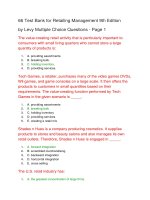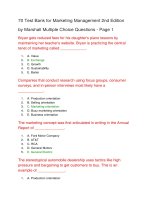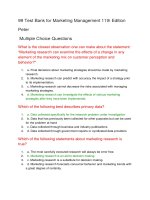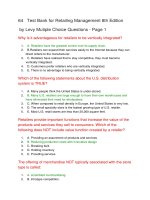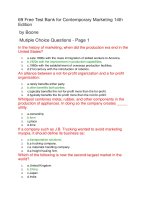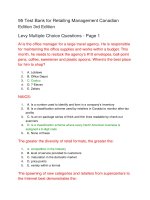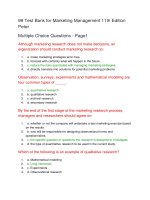111 test bank for contemporary management 7th edition jones
Bạn đang xem bản rút gọn của tài liệu. Xem và tải ngay bản đầy đủ của tài liệu tại đây (146.8 KB, 23 trang )
Test Bank for Contemporary Management 7th Edition
Jones
(p. 52) The "number of levels" of management between the
CEO and the first-line supervisors in the organization
is a representation of which of Fayol's principles?
1.
2.
3.
4.
5.
A. Unity of direction
B. Unity of command
C. Discipline
D. Centralization
E. Line of authority
(p. 51) When a restaurant has a standard practice that each
cook should leave the kitchen in a clean condition and
ready for the next shift, this is an example of:
1.
2.
3.
4.
5.
A. An SOP
B. Bureaucracy
C. Job specialization
D. A rule
E. Equity
(p. 54) An organization that has developed respectful
relations between organizational members and reflects
the quality of an organization's leadership and a
manager's ability to act fairly and equitably is a result
Fayol's principle of:
1.
2.
3.
4.
5.
A. Stability of tenure of personnel
B. Unity of direction
C. Order
D. Initiative
E. Discipline
(p. 51) Car detailers at Scott's Car Center are required to log
their time on each vehicle they detail. This practice is
called:
1.
2.
3.
4.
5.
A. A norm
B. The line of authority
C. A rule
D. The division of labor
E. A guideline
(p. 54) Which of the following is NOT a part of Fayol's
principle of remuneration of personnel?
1.
2.
3.
4.
5.
A. Employee pay is fair for both the employee and the organization
B. Encourage productivity by rewarding will directed effort
C. Not be subject to abuse
D. Be uniformly applied to all employees
E. Management pay be based on cost reductions
(p. 47) The Gilbreths are best known for their studies of:
1.
2.
3.
4.
5.
A. Fatigue
B. Administrative management
C. Human relations
D. Management science
E. Bureaucracy
(p. 53) An organization that has a comprehensive long range
plan that guides the direction of every department
within the organization is following Fayol's principle
of:
1.
2.
3.
4.
5.
A. Order
B. Line of authority
C. Unity of command
D. Unity of direction
E. Centralization
(p. 51) Unwritten, informal codes of conduct which prescribe
how workers should act in specific work situations are
known as:
1.
2.
3.
4.
5.
A. Rules
B. Standard operating procedures
C. Ethics
D. Norms
E. Esprit de corps
(p. 51) Mamma Mia's Ristorante has an informal practice in
which all the servers try to help each other out if they
are not busy with customers. This practice is called:
1.
2.
3.
4.
5.
A. Job specialization
B. A rule
C. Unity of direction
D. A norm
E. An open system
(p. 42) Small workshops run by skilled workers who
produced hand-manufactured products was a system
known as:
1.
2.
3.
4.
5.
A. NUMMI
B. Small batch production
C. Mass production manufacturing
D. Crafts production
E. Automation
(p. 45-46) Which of the following was NOT part of
"Fordism"?
1.
2.
3.
4.
5.
A. Checking on how employees lived
B. Doubling wages
C. Cutting back on work hours
D. Not permitting employees to talk while on the line
E. Employee involvement
(p. 51) Specific written instructions as to how a worker
should perform an aspect of his or her work task are
known as:
1.
2.
3.
4.
5.
A. Norms
B. Standard operating procedures
C. Job specialization
D. Unity of command
E. Goals
(p. 53-54) An "organization chart" which shows who reports
to whom for what is a representation of which one of
Fayol's principles?
1.
2.
3.
4.
5.
A. Centralization
B. Equity
C. Discipline
D. Order
E. Initiative
(p. 52-53) According to Fayol, the greater the number of
levels in the management hierarchy, the __________
communication takes between managers at the top
and bottom of the organization and the __________ the
pace of planning and organizing.
1.
2.
3.
A. Longer; faster
B. Longer; slower
C. Shorter; faster
4.
5.
D. Shorter; slower
E. None of the above.
(p. 52) What principle specifies that an employee should
report to only one superior?
1.
2.
3.
4.
5.
A. Line of authority
B. Unity of command
C. Centralization
D. Job specialization
E. Job design
(p. 52) The "chain of command" which describes the
reporting relationships of managers from the top to the
bottom of the organization is known as:
1.
2.
3.
4.
5.
A. The line of authority
B. Responsibility
C. Unity of direction
D. Unity of command
E. Unity of authority
(p. 53) When authority is concentrated at the top of the
organizational chart instead of being distributed
throughout the management hierarchy, we say that
__________ has occurred.
1.
2.
3.
4.
5.
A. Decentralization
B. A bureaucracy
C. Centralization
D. Scientific management
E. Job specialization
(p. 53-54) Fayol's principles of order can be illustrated by:
1.
2.
3.
4.
5.
A. Organizational chart
B. Job description
C. Unity of direction
D. Unity of responsibility
E. PERT chart.
(p. 51) A public works department's employee manual states
that standard practice is that all employees working
along the roadway should wear a "reflective vest" at all
times. This is an example of:
1.
2.
3.
A. A norm
B. A rule
C. A guideline
4.
5.
D. A program
E. A standard
(p. 43) F.W. Taylor founded the early study of management
thought which became known as:
1.
2.
3.
4.
5.
A. Time and motion study
B. Scientific management
C. Fordism
D. Management Science Theory
E. Theory X
(p. 43) What is the process by which a division of labor
occurs as different workers specialize in tasks?
1.
2.
3.
4.
5.
A. Job specialization
B. Systems management
C. Management science
D. Job rotation
E. Scientific management
(p. 44) Early "time-and-motion" studies were an important
part of the work of:
1.
2.
3.
4.
5.
A. Elton Mayo
B. F.W. Taylor
C. William Ouchi
D. Daniel Katz
E. Lawrence & Lorsch
(p. 52) "Informal authority" can result from all the following
EXCEPT:
1.
2.
3.
4.
5.
A. Technical knowledge
B. Moral character
C. Hierarchical authority
D. The ability to lead
E. Job expertise
(p. 53) Today's managers are paying particular attention to
treating people fairly. This is most consistent with
Fayol's principle of:
1.
2.
3.
4.
5.
A. Discipline
B. Unity of command
C. Initiative
D. Order
E. Equity.
(p. 51) Formal written instructions that specify actions to be
taken under different circumstances to achieve
specific goals are known as:
1.
2.
3.
4.
5.
A. Rules
B. Norms
C. Esprit de corps
D. Standard operating procedures
E. SOPs
(p. 52) A mechanical engineer at TNT Manufacturing LLC
reports jointly to the Engineering Manager and the
Project Manager. This is a violation of which one of
Fayol's principles?
1.
2.
3.
4.
5.
A. Centralization
B. Unity of command
C. Unity of direction
D. Line of authority
E. Chain of command
(p. 54) Fayol's principle of initiative suggests:
1.
2.
3.
4.
5.
A. Managers should encourage employees to be creative
B. Creativity is only the responsibility of management
C. Innovation flows from the top down
D. Employees actions be monitored by a supervisor
E. Initiative flows from the top down
(p. 53) The Marketing Manager at RST Global Inc. developed
a five year marketing plan that deviated from the
objectives outlined in the organization's strategic plan.
The manager has deviated from which of the
following?
1.
2.
3.
4.
5.
A. Order
B. Line of authority
C. Unity of command
D. Unity of direction
E. Centralization
(p. 50) The power to hold workers accountable for their
actions and to make decisions about the use of
organizational resources is known as:
1.
2.
3.
A. Power
B. Job specialization
C. Authority
4.
5.
D. Centralization
E. Unity of Command
(p. 50) Which of the following gives managers the right to
direct and to control their subordinates in order to
attempt to accomplish organizational goals?
1.
2.
3.
4.
5.
A. Theory X
B. Centralization
C. Esprit de corps
D. Authority
E. Discipline
(p. 54) Obedience to a manager's request, along with other
signs of respect for the manager's authority, is most
consistent with Fayol's principle of:
1.
2.
3.
4.
5.
A. Order
B. Discipline
C. Esprit de corps
D. Equity
E. Unity of command
(p. 54) If an organization has a profit-sharing plan in which
top executives are able to purchase the company's
stock at a discount whenever the organization has a
highly profitable year, this organization is acting
consistently with Fayol's principle of:
1.
2.
3.
4.
5.
A. Unity of command
B. Discipline
C. Line of authority
D. Unity of direction
E. Remuneration of personnel.
63 Free Test Bank for Contemporary Management 7th
Edition Jones Multiple Choice Questions - Page 2
(p. 57) The research studies which experimented with
different levels of lighting and its impact on worker
performance and fatigue are known as:
1.
2.
3.
4.
5.
A. The Fayol studies
B. The Taylor studies
C. The Hawthorne studies
D. The Katz studies
E. The Weber studies
(p. 62) The aspect of management theory that analyzes
production systems to increase efficiency is:
1.
2.
3.
4.
5.
A. Contingency management
B. TQM
C. Operations management
D. Scientific management
E. Human relations management
(p. 65) Apple's external environment is changing rapidly and
it responds by decentralizing decisions to lower-level
managers so that the organization can react faster.
Apple is said to be organized under:
1.
2.
3.
4.
5.
A. A mechanistic structure
B. A centralization structure
C. A behavioral management structure
D. A human relations structure
E. An organic structure
(p. 54) The idea that employees who stay with the
organization for many years develop skills on the job
which can help the organization to become more
efficient is consistent with Fayol's principle of:
1.
2.
3.
4.
5.
A. Equity
B. Order
C. Initiative
D. Discipline
E. Stability of tenure.
(p. 63) Organizations that are likely to experience entropy
have all the characteristics EXCEPT:
1.
2.
3.
4.
5.
A. Are closed systems
B. Are open systems
C. Ignore external environments
D. Fail to acquire inputs
E. Dissolve and disintegrate
(p. 56) Whose theory holds that, "Authority should go with
knowledge¼whether it is up the line or down"?
1.
2.
3.
4.
5.
A. Follett
B. Weber
C. Hawthorne
D. Fayol
E. Taylor
(p. 62) What theory went beyond the study of how managers
can influence behavior within organizations to
consider how managers control the organization's
relationship with its external environment?
1.
2.
3.
4.
5.
A. Scientific management
B. Management science
C. Administrative management
D. Organizational environment theory
E. Theory X
(p. 59) The HP way is consistent with Theory Y because of all
the following characteristics EXCEPT:
1.
2.
3.
4.
5.
A. Vertical communication
B. Formality among management and workers
C. Following rules
D. Secrecy
E. Team atmosphere
(p. 58) The study of the factors that have an impact on how
workers respond to one another within organizations
is known as:
1.
2.
3.
4.
5.
A. The Hawthorne studies
B. Organizational behavior
C. Unity of command
D. Scientific management
E. Organic structure
(p. 64) The idea that the effectiveness of organizational
structure and control systems depends on what
outside forces it is facing is called:
1.
2.
3.
4.
5.
A. Behavioral management
B. Contingency theory
C. Quantitative management
D. Administrative management
E. Human relations management
(p. 54) The idea that workers should be aware of how their
behavior affects the performance of the organization
as a whole is most consistent with Fayol's principle
of:
1.
2.
3.
A. Equity
B. Subordination of individual interests to the common interest
C. Remuneration of personnel
4.
5.
D. Unity of direction
E. Stability of tenure of personnel.
(p. 64) Which principle would a manager be following if she
created a flexible organization that could react quickly
in a highly volatile market?
1.
2.
3.
4.
5.
A. Management science theory
B. Fayol's theory
C. Contingency theory
D. Bureaucracy theory
E. Scientific management
(p. 64) Because of its organized system, the marketing
department, project development department, and the
manufacturing department at Google combined their
efforts and were able to capture market share of the
search engine industry. The organization is said to be
experiencing:
1.
2.
3.
4.
5.
A. Inertia
B. Innovation
C. Synergy
D. Unity of command
E. Unity of direction
(p. 64) What management theory is Bill following if his
management style depends upon the situation?
1.
2.
3.
4.
5.
A. Theory Z
B. Contingency theory
C. Theory X
D. Organic theory
E. Theory Y
(p. 54) When a manager asks a subordinate to consider how
his or her actions are impacting the entire organization
instead of merely focusing on the subordinate's own
interests, this manager is acting on the basis of
Fayol's principle of:
1.
2.
3.
4.
5.
A. Equity
B. Initiative
C. Subordination of individual interests to the common interest
D. Remuneration of personnel
E. Stability of tenure of personnel.
(p. 57) Workers' feelings and thoughts can affect
performance was one of the main implications of:
1.
2.
3.
4.
5.
A. Fredrick Taylor work
B. Hawthorne studies
C. Max Weber's theory
D. Management science
E. Scientific management
(p. 62) The collection of forces that exist beyond the
organization's physical boundaries but which affect
the manager's ability to obtain and to use resources is
known as:
1.
2.
3.
4.
5.
A. The organizational environment
B. The administrative environment
C. The Hawthorne effect
D. The informal organization
E. The open system
(p. 63) A system which takes resources from its external
environment and converts them into goods that are
then sent back into that environment is known as:
1.
2.
3.
4.
5.
A. A conversion system
B. An output system
C. An input system
D. An open system
E. A behavioral system
(p. 62) The management theory that focuses on the use of
rigorous, quantitative techniques that are intended to
assist managers to make the best use of
organizational resources is called:
1.
2.
3.
4.
5.
A. Contingency theory
B. Management science theory
C. Administrative management theory
D. Behavioral management theory
E. Human relations theory
(p. 54) When a manager and his or her subordinates share
feelings of comradeship and devotion to a common
cause, they are expressing Fayol's principle of:
1.
2.
3.
A. Unity of command
B. Order
C. Discipline
4.
5.
D. Esprit de corps
E. Laissez-faire.
(p. 57) The Human relations movement advocates:
1.
2.
3.
4.
5.
A. Employees are by nature lazy and avoid responsibility
B. Managers closely supervise all employees
C. Employees must also be monitored outside the workplace
D. Supervisors are to be behaviorally trained to manage subordinates
E. Employee is always right
(p. 59) Dwight strives to create a work setting that provides
his employees a source of job satisfaction. Dwight's
actions are consistent with the principles of:
1.
2.
3.
4.
5.
A. Theory X
B. Theory Y
C. Contingency theory
D. Management science theory
E. Scientific management theory
(p. 58) All of the following are characteristics of the informal
organization EXCEPT:
1.
2.
3.
4.
5.
A. Groups tend to develop elaborate procedures.
B. Group norms are developed.
C. As more time passes members of the group bond.
D. Understanding the behavior is an easy process.
E. The informal organization can thwart the attainment of organizational goals.
(p. 62) The aspect of management theory that uses
mathematical techniques such as modeling and
simulation to help managers make better decisions is
called:
1.
2.
3.
4.
5.
A. Behavioral management
B. Contingency management
C. Quantitative management
D. Administrative management
E. Human relations management
(p. 56) Which of the following is NOT one of the contributions
of Mary Parker Follett?
1.
2.
3.
4.
5.
A. Managers should act as coaches, not monitors
B. Managers must recognize that workers try to avoid responsibility
C. The importance of cross-functional communication
D. Power should flow to the person with the most expertise in any given situation
E. Workers should be involved in job analysis.
(p. 64) The concept that: "There is no one best way to
manage" is a fundamental premise in:
1.
2.
3.
4.
5.
A. Scientific management theory
B. Administrative management theory
C. Contingency theory
D. Behavioral management theory
E. Management science theory
(p. 64) When an organization experiences performance gains
caused by two or more departments coordinating their
efforts, the organization is said to be experiencing:
1.
2.
3.
4.
5.
A. Synergy
B. Innovation
C. Initiation
D. Order
E. Unity of direction
(p. 59-61) Trader Joe's approach to management is
consistent with Theory Y because:
1.
2.
3.
4.
5.
A. Trader Joe's makes sure employees have the resources they need.
B. The role of the managers at Trader Joe's is to control the employees.
C. Trader Joe's closely monitors all employees.
D. Employees at Trader Joe's are lazy and dislike work.
E. Trader Joe's has a well-defined system of rewards and punishments to control
behavior.
(p. 65) Managers at Acme Explosives supervise workers
closely and use rewards and punishments to control
their behavior. Acme is a ________ organization.
1.
2.
3.
4.
5.
A. Bureaucratic
B. Organic
C. Efficient
D. Mechanistic
E. Behavioral
(p. 59) Managers who accept the assumptions of Theory X
have the following characteristics EXCEPT:
1.
2.
3.
4.
5.
A. Focus on developing SOPs
B. Develop a well-defined system of rewards and punishments
C. Give little autonomy to workers to solve problems
D. Focus on developing rules
E. Create a work setting that encourages commitment
(p. 59) Managers who accept Theory Y:
1.
2.
3.
4.
5.
A. Create a work setting that encourages commitment
B. Give little autonomy to workers
C. Focus on developing rules and procedures
D. Rely on rewards and punishments
E. View workers as lazy
37 Free Test Bank for Contemporary Management 7th
Edition Jones True - False Questions
(p. 62) Managers must only focus on influencing the
behavior within organizations because they have no
control over the organization's relationship with its
external environment.
1.
2.
True
False
(p. 59) Henry Ford's approach to management more closely
reflects the assumptions of Theory X than Theory Y.
1.
2.
True
False
(p. 43) Scientific management theory holds that the most
efficient division of labor can best be determined by
intuitive knowledge.
1.
2.
True
False
(p. 50) In a bureaucracy, the authority of a manager should
be based on their performance.
1.
2.
True
False
(p. 54) Fayol did recommend the use of organizational charts
to show the position and duties of managers within the
organization.
1.
2.
True
False
(p. 43) Adam Smith reasoned that a group of workers who
each performed many tasks could produce a product
faster than workers who were specialized at their
specific tasks.
1.
2.
True
False
(p. 57) The Human relations movement advocated that
supervisors be behaviorally trained to manage
subordinates in ways that elicit their cooperation and
increase their productivity.
1.
2.
True
False
(p. 53) According to Fayol, the fewer the number of levels in
the hierarchy of the chain of command of an
organization, the faster the pace of the planning and
organizing within the organization.
1.
2.
True
False
(p. 50) Authority gives managers the right to direct and
control their subordinates' behavior to achieve
organizational goals.
1.
2.
True
False
(p. 44) Scientific management caused many workers to
distrust management.
1.
2.
True
False
(p. 61) Trader Joe's approach to management is to create a
policy of promotion from within the company so that
the highest-performing salespeople could rise to
become store captains and beyond in the organization.
Trader Joe's always recognizes the need to treat
employees (people) in a fair and equitable way. This
philosophy of management is consistent with Theory
Y.
1.
True
2.
False
(p. 58) Theory Y assumes that workers are lazy, dislike work,
and will try to do as little work as possible.
1.
2.
True
False
(p. 59) Hewlett-Packard established a philosophy of
management known as the "HP Way" that is peopleoriented, stresses the importance of treating every
person with consideration and respect, and offers
recognition for achievements. This philosophy of
management is consistent with Theory X.
1.
2.
True
False
(p. 49) Max Weber described a system of administration
designed to insure both efficiency and effectiveness
that is called "bureaucracy".
1.
2.
True
False
(p. 62) The use of information technology detracts from the
usefulness of management science approaches.
1.
2.
True
False
(p. 51) Standard operating procedures are general,
sometimes informal instructions as to how workers
should perform an aspect of their work task.
1.
2.
True
False
(p. 39) The development of mass-production manufacturing
is attributed to manufacturing managers at Ford
Manufacturing.
1.
2.
True
False
(p. 47-49) Andrew Carnegie was able to create the most
successful industrial company of his day, Carnegie
Steel, by empowering his workers.
1.
True
2.
False
(p. 52) Fayol believed that "dual command" increased
efficiency and verified the formal hierarchy of
authority.
1.
2.
True
False
(p. 40) The development of "lean manufacturing" is attributed
to manufacturing managers at Ford.
1.
2.
True
False
(p. 40) The idea of "lean manufacturing" relies on workers
performing narrow, specialized tasks.
1.
2.
True
False
(p. 53) Fayol believed that authority should be decentralized
and not be concentrated at the top of the chain of
command of the organization.
1.
2.
True
False
(p. 57) In the Hawthorne studies, researchers found that as
they raised and lowered the level of illumination, the
workers' productivity increased.
1.
2.
True
False
(p. 52) The line of authority that depicts the authority of
managers at the top over employees at the bottom of
the organization is called the "chain of command."
1.
2.
True
False
(p. 39) Ford Manufacturing moved from small batch
production to mass-production manufacturing to
increase efficiency.
1.
2.
True
False
(p. 55) Peters and Waterman's In Search of Excellence
identified three major principles to guide managers.
These three principles verify Fayol's principles.
1.
2.
True
False
(p. 57) The Hawthorne effect suggested that workers'
attitudes toward their managers have little to no affect
on the level of workers' performance.
1.
2.
True
False
(p. 64) The contingency theory suggests that there is only
one best way to organize.
1.
2.
True
False
(p. 65) Typically, managers who work in a mechanistic
structure can react more quickly to change than
managers who work in an organic structure.
1.
2.
True
False
(p. 62) Management science theory is a contemporary
approach to management that focuses on the use of
rigorous qualitative techniques to help managers make
maximum use of organizational resources to produce
goods and services.
1.
2.
True
False
(p. 53) When authority is centralized, only managers at the
top of the organization make important decisions.
1.
2.
True
False
(p. 43) According to the principles of Scientific Management,
the way to create the most efficient work system was
by having workers perform both more tasks and more
complex tasks.
1.
2.
True
False
(p. 51) According to Fayol's principles, workers should be
given more job duties to perform but should be
encouraged to assume less responsibility for their
work outcomes.
1.
2.
True
False
(p. 51) Rules are formal, written instructions that specify
what workers should do on the job.
1.
2.
True
False
(p. 58) Theory Y assumes that workers are not lazy, do not
dislike work, and will do what is good for the
organization.
1.
2.
True
False
(p. 51) Norms are written, formal codes of conduct which
prescribe how workers should act in particular
situations.
1.
2.
True
False
(p. 54) Esprit de corps is the French expression that refers to
shared feelings of comradeship and enthusiasm.
1.
2.
True
False
11 Free Test Bank for Contemporary Management 7th
Edition Jones Free Text Questions
(p. 46) Discuss the management contributions of the
Gilbreths.
Answer Given
Frank Gilbreth (1868-1924) and Lillian Gilbreth (1878-1972), refined Taylor's
analysis of work movements and made many contributions to time-and-motion
study. Their aims were to (1) analyze every individual action necessary to perform
a particular task and break it into each of its component actions, (2) find better
ways to perform each component action, and (3) reorganize each of the
component actions so that the action as a whole could be performed more
efficiently-at less cost in time and effort.
(p. 53) Centralization versus decentralization is one of the
more interesting arguments in management theory.
Discuss the pros and cons of each of these two
organizing methods in terms of how a large
organization can be organized in terms of its decisionmaking authority.
Answer Given
Centralization gives managers more control, which helps an organization pursue
its strategy. However, centralization makes it difficult for people closest to
problems to respond quickly to them. It can also reduce motivation, and inhibit
adaptability and flexibility. Decentralization increases flexibility, responsiveness,
and motivation. However, the organization risks losing some control over what
goes on in the organization.
(p. 49-50) Define bureaucracy and identify the five principles
that a bureaucratic system of administration is based
on.
Answer Given
A bureaucracy is a formal system of organization and administration designed to
ensure efficiency and effectiveness. The five principles include: (1) Formal
authority is derived from the position held within the organization. (2) Selection
and evaluation system that rewards employees fairly and equitably. (3) Clearly
specified system of task and role relationships. (4) Clearly specified hierarchy of
authority. (5) System of written rules and standard operating procedures that
specify how employees should behave.
(p. 65) Explain the "organic structure". Why is it important
for companies like Google and Apple to operate with
organic structures?
Answer Given
In an organic structure, authority is decentralized to middle and first-line managers
to encourage them to take responsibility and act quickly to pursue scarce
resources. Departments are encouraged to take a cross-departmental or
functional perspective, and cross-functional teams composed of people from
different departments are formed. The organization operates in an organic way
because authority rests with the individuals, departments, and teams best
positioned to control the current problems the organization is facing. Companies
like Google and Apple operate with organic structures because their organizational
environments are rapidly changing and unstable. Though more expensive to
operate, managers in an organic structure can react more quickly to a changing
environment than can managers in a mechanistic structure.
(p. 62) Define management science theory and identify and
explain the branches of management science.
Answer Given
Management science theory is a contemporary approach to management that
focuses on the use of rigorous quantitative techniques to help managers make
maximum use of organizational resources to produce goods and services. The
four branches of management science include: (1) Quantitative management uses
mathematical techniques to help managers make decisions; (2) Operations
management gives managers a set of techniques they can use to analyze
production processes; (3) TQM attempts to increase product quality; (4) MIS's
provide managers with information about what is going on in the organization, to
use for control, problem solving, and decision making.
(p. 49-52) Define administrative management and briefly
discuss two major contributions from Max Weber and
Henri Fayol.
Answer Given
Administrative management is the study of how to create an organizational
structure and control system that leads to high efficiency and effectiveness.
Weber's contributions include the development of the principles of bureaucracy
which included: (1) A manager's formal authority derives from his/her position; (2)
People should occupy positions because of their performance; (3) The extent of
authority and responsibility of a position and its relationship to other positions
should be clearly specified; (4) Authority can be exercised effectively if all positions
are arranged hierarchically, and all employees know to whom they report; (5)
Managers must create a system of clear rules, SOPs, and norms to control
behavior effectively. Fayol's contributions identified 14 principles (summarized in
Table 2.1) that he believed essential to increase the efficiency of the management
process.
(p. 57-58) The Hawthorne studies had a great impact on the
early study of management theory. Discuss these
studies in terms of how they were designed and in
terms of the results which were helpful to developing a
better understanding of how managers should behave
in the workplace.
Answer Given
The Hawthorne Studies began as an attempt to study how characteristics of the
work setting, particularly the level of illumination, affected worker productivity.
Unexpectedly, the researchers found that regardless of whether they raised or
lowered the level of illumination, workers' performance increased. In trying to
explain this finding, researchers recognized that (1) their own presence was
having an effect on workers, and (2) that other factors, social in nature, also
affected workers' performance.
(p. 63) Differentiate between an open and a closed system.
Answer Given
An open system is a system that takes in resources from its external environment
and converts or transforms them into goods and services that are sent back to that
environment. The system is said to be open because the organization draws from
and interacts with the external environment in order to survive; in other words, the
organization is open to its environment. A closed system, in contrast, is a self
contained system that is not affected by changes in its external environment.
(p. 59) Managers who accept the assumptions of McGregor's
Theory X are likely to design a very different work
situation than managers who accept the assumptions
of Theory Y. Discuss how managers who are
committed to Theory X assumptions are likely to
organize their work environment in terms of their
relationships with their subordinates.
Answer Given
Managers who are committed to Theory X assumptions are likely to design a work
environment in which they have a great deal of control over the subordinates' work
and behavior. They are likely to focus on developing rules of conduct, SOPs, and
a clearly-defined system of rewards and punishments in order to give their
subordinates very little autonomy to solve problems without checking with the
manager beforehand. They are likely to supervise the work of their subordinates
closely to make sure that these subordinates are working hard and are following
the rules of conduct which they have established.
(p. 43-45) F.W. Taylor, in his study of what came to be called
scientific management, developed four principles
which were intended to increase worker efficiency on
the job. Define scientific management and discuss any
two of these four principles and explain how each of
them could be applied to workers in an automobile
assembly line.
Answer Given
Scientific management is the systematic study of relationships between people
and tasks for the purpose of redesigning the work process to increase efficiency.
Taylor's four principles are: (1) Study the way workers perform their tasks, gather
all the informal knowledge the workers have, and experiment with ways of
improving how tasks are performed. (2) Codify the new methods into written rules
and SOPs. (3) Carefully select workers who possess the skills and abilities that
match the tasks, and train them to perform according to established rules and
SOPs. (4) Establish a fair level of performance for a task, and then pay reward to
those who perform over that level.
(p. 44) Discuss how scientific management brought many
workers more hardship than gain and a distrust of
managers.
Answer Given
Some managers using scientific management obtained increases in performance,
but rather than sharing performance gains with workers through bonuses as Taylor
had advocated, they simply increased the amount of work that each worker was
expected to do. Many workers experiencing the reorganized work system found
that as their performance increased, managers required that they do more work
for the same pay. Workers also learned that performance increases often meant
fewer jobs and a greater threat of layoffs because fewer workers were needed. In
addition, the specialized, simplified jobs were often monotonous and repetitive,
and many workers became dissatisfied with their jobs.
